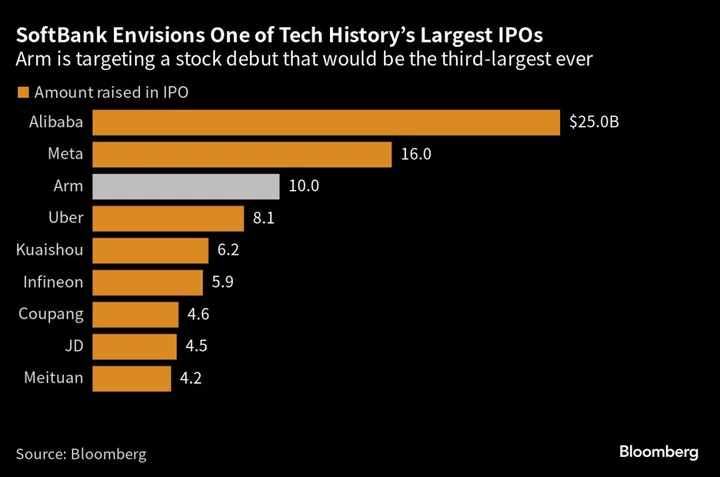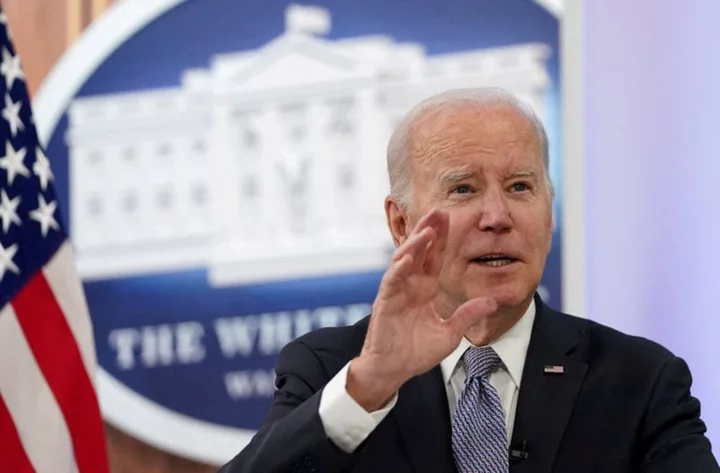SoftBank Group Corp.’s Arm Holdings Ltd. took a step toward what’s set to become the biggest US initial public offering of the year, a bet that the once-obscure designer of phone chips can flourish in the era of artificial intelligence computing.
In a long-awaited regulatory filing Monday, Arm said the offering is being led by Barclays Plc, Goldman Sachs Group Inc., JPMorgan Chase & Co. and Mizuho Financial Group Inc. The document listed 24 other underwriters below that top tier — with Morgan Stanley notably absent.
A successful debut by Arm would provide a windfall for SoftBank founder Masayoshi Son, whose Vision Fund lost a record $30 billion last year. It could also spur dozens of startups to pursue — or further delay — their own IPO plans. That includes companies like online grocery-delivery firm Instacart Inc. and marketing and data automation provider Klaviyo.
Arm plans to start its roadshow the first week of September and price the IPO the following week, Bloomberg has reported. Arm didn’t disclose proposed terms for the share sale in the document, but it’s expected to seek a valuation of $60 billion to $70 billion.
Read More: All About Arm and Why It’s The Biggest IPO of 2023
While Arm had been aiming to raise $8 billion to $10 billion in the IPO, that target could be lower since SoftBank has decided to hold onto more of the company after buying Vision Fund’s stake in it. That transaction valued Arm at more than $64 billion, based on the filing.
Even so, the offering promises to give the struggling IPO market its biggest lift in almost two years. The listing is poised to be the largest in the US since electric-vehicle maker Rivian Automotive Inc.’s $13.7 billion offering in October 2021. It could rank near or even just below the tech industry’s largest-ever IPOs: Alibaba Group Holding Ltd.’s $25 billion 2014 offering and 2012’s $16 billion debut by Meta Platforms Inc., then known as Facebook Inc.
Read More: Instacart Is Said to Plan for September IPO
Arm’s target valuation reflects a belief that it will benefit from the stampede toward artificial intelligence chips and generative AI — an industry shift that has helped give chipmaker Nvidia Corp. a $1 trillion valuation.
“A strong performance from Arm will not only be a major windfall for SoftBank, but also reinforce its AI strategy by showing the market hype around AI hasn’t waned,” said Kyle Stanford, an analyst at PitchBook.
Though Arm’s technology is used in almost every smartphone, it isn’t well-known among consumers. Arm sells the blueprints needed to design microprocessors, and licenses technology known as instruction sets that dictate how software programs communicate with those chips. The power efficiency of Arm’s technology helped make it ubiquitous on phones, where battery life is critical.
Rene Haas, who took over as Arm’s chief executive officer last year, is now working to expand beyond the smartphone market, which has stagnated in recent years. He’s setting his sights on more advanced computing, particularly the chips for data centers and AI applications.
Processors for that market are among the most expensive — and profitable — in the industry. Amazon.com Inc. has adopted Arm-based chips for its Amazon Web Services because it says they are more efficient both in terms of energy and economics. They are used by 40,000 AWS customers.
SoftBank will remain the controlling shareholder of Arm after it begins trading, according to the filing. SoftBank has acquired substantially all of the Vision Fund’s 25% stake in Arm for $16.1 billion, according to the filing.
The paperwork also confirmed that Arm saw its revenue decline about 1% in its last fiscal year. The company’s sales fell to $2.68 billion for the year ended March 31, according to the document, which is still subject to change.
The overall chip industry is still contending with a sales slump, worsened by a glut of inventory. The smartphone market has been hit especially hard. Qualcomm Inc., one of Arm’s biggest partners, gave a disappointing forecast for the latest quarter earlier this month, sending its shares tumbling. And even Apple Inc.’s prized iPhone has seen demand slow.
Arm, based in Cambridge, UK, plans for its shares to trade on the Nasdaq Global Select Market under the symbol ARM. The filing confirms that the IPO’s top four banks will be acting as joint bookrunning managers of the offering. Bloomberg News has reported that the four will get an equal share of the fees, breaking with standard practice.
In the filing, Arm called itself an “engineering-first company,” with 4,753 of its workers — or about 80% of global employees — focused on research, design and technical innovation. The company said its owns or co-owns about 6,800 issued patents and has approximately 2,700 patent applications pending worldwide, many of which are relevant to the key technologies used in many of the chips manufactured today.
In the last fiscal year, more than 260 companies were using Arm-based chips, including Amazon, Alphabet Inc., Qualcomm and Advanced Micro Devices Inc. Among its top ten customers by royalty revenue last fiscal year, the company has worked with those partners for an average of more than 20 years.
As AI fever has swept the tech industry, companies will need the right chips to run complex software. Arm says that every processor it designs will accelerate the AI and machine learning tech that it helps power. Its processors already run those technologies, and the company has started adding new functionality to make the algorithms required run faster.
As part of that push, Arm is working with Alphabet, autonomous driving company Cruise, Mercedes-Benz, Meta and Nvidia to deploy Arm technology that can run AI-based software.
Arm was founded in 1990 as a joint venture between Acorn Computers, Apple and VLSI Technology. It was listed on the London Stock Exchange and Nasdaq from 1998 until 2016, when SoftBank acquired the business for $32 billion.
SoftBank previously attempted to sell Arm to Nvidia in a $40 billion deal, which would have been the largest chip industry takeover. But the purchase faced opposition from regulators and Arm’s own customers, and Nvidia walked away from it last year. SoftBank then embarked on its plan for the IPO.
--With assistance from Min Jeong Lee, Giles Turner, Amy Or and Alex Barinka.
(Updates with more from filing starting in fourth paragraph.)









